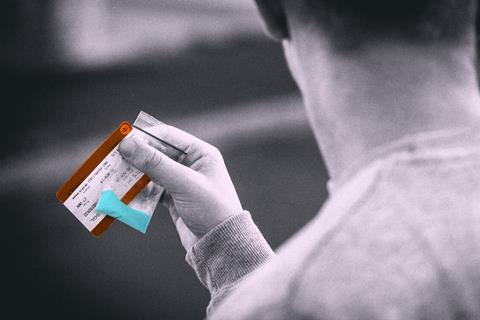Karen Murdarasi highlights the alarming ‘county lines’ activity that is leading ever more teens into a life of crime

You’re at the station and there’s a kid in the shadows on the opposite platform. They’re maybe 14 or 15. They look nervous, keep checking their phone. An adult walks up, there’s a quick conversation, perhaps something quickly changes hands. And then the kid is gone. In those seconds, you could have witnessed one of the many children caught up in county lines.
If “county lines” means nothing to you, you’re not alone. It refers to the use of children to transport drugs, sometimes within their local area, but often from urban areas to more rural ones, like a criminal Deliveroo. The name comes from dedicated phone lines that are used to order the drugs, although these days a lot of the communication happens over messaging apps. It’s a widespread problem, with 90% of English police forces seeing county lines activity within their area. The operation is run by powerful drugs gangs who recruit victims using sophisticated methods. (For more on this go here).
Exploiting the vulnerable
As with most forms of trafficking, traffickers exploit people who are already vulnerable – but just being a child is a vulnerability in itself. According to safeguarding agency Praesidio, groomers exploit people who are looking for identity, belonging and purpose – a description that could apply to almost any teenager. Children aged 14 – 17 are the most likely to be involved in county lines, but sometimes younger children are targeted too, even those of primary school age. Children in care or excluded from school are at higher risk, but county lines also draws in suburban, middle-class children. Any child, in your family or your church, could be a target. To help protect them, it is vital to understand the problem.
The appeal of wealth, power and status is a key way in for county lines groomers. Hyper-online kids are constantly exposed to content that promotes unrealistic, unattainable lifestyles. Powerful influencer figures like Andrew Tate (who is himself facing charges of criminal exploitation) give advice on how to become a “high value” individual. According to Tate, “the core message is that I have financial freedom so it’s hard to tell me what to do.” But he is not talking about working hard at school and building a good career: “If your plan to get rich is longer than three years, it’s a fantasy.”
County lines groomers often use the same social media and apps as influencers to reach out to children they can exploit, although they may approach children in person, too. The relationship starts with apparent respect, with expensive gifts, new friends and free drugs, but it soon becomes controlling and even violent. Children are then forced to transport drugs and pick up cash payments under the threat of harm to themselves or their families.
County lines drug trafficking is big money for the gangs, but less so for exploited children. Although teenagers may be lured in by the expensive presents and the promise of good money, they can instead find themselves in debt, if they have to dispose of the product so as not to get caught with it, or if it is stolen. There are even stories of drugs gangs organising fake robberies of their own recruits, so that they can keep them in debt bondage. To help a young person to escape from this situation, it’s important firstly to know the signs that they may be caught up in it.
Key things to look out for are new, expensive possessions that they should not be able to afford – new clothes or shoes, or new tech. They may carry a lot of cash on them, or have two mobile phones. Another indicator can be a change in friendship groups, especially if they are secretive about the new friends that they are spending all their time with. They may start to cut school, or drop extra-curricular activities. If it is a child you know well, you will probably notice a change in their demeanour and their usual activities, or a new tendency towards being secretive. Finding unexplained travel tickets and receipts, or noticing that they have cuts, bruises or other unexplained injuries, can also suggest that a young person is being forced to transport drugs.
This can affect anyone in any family
Any young person can be a target for county lines groomers, so it is important for parents and everyone who works with young people to help protect them. Joy Gillespie, CEO of Survivors of Human Trafficking in Scotland (SOHTIS) explains that the key thing is to keep lines of communication open at all times: “You need to have positive, open relationships where there are no ‘taboo’ topics or judgement. If these are not already present then it will be almost impossible to discuss trafficking.” She suggests using news stories about trafficking, or the storylines of popular TV programmes, as a way in to discuss trafficking with your children. SOHTIS also has anti-trafficking resources that can provide youth workers with engaging activities to explore this subject with young people.
If a child confides in you about being exploited, the most important thing is to listen without judgement, without making them feel it is their fault, and to let them know that they did the right thing by telling you. It will probably be appropriate to get the police involved at that point – drugs gangs are serious organised crime, and you should absolutely not try to tackle them yourself. Alternatively, you could contact Crimestoppers anonymously (0800 555 111). If you suspect a child is being exploited but you don’t have the kind of relationship with them where you can ask them, or they won’t open up to you, you can get good advice from the NSPCC helpline (0808 800 5000).
Youth groups help
“Youth groups are vital in helping prevent county lines,” advises Joy Andrew, Development Manager at the anti-trafficking charity Restore Glasgow. “They build resilience and a sense of self-worth in young people, and they can teach their young people how to spot the signs of exploitation. The sense of belonging they create can help prevent teenagers being susceptible to grooming by drug gangs. It also makes sure the young people have time every week to chat with the leaders about any issues that are worrying them.”
But one of the most helpful and long-term forms of protection that you can offer to children and teenagers who may be at risk from groomers is modelling a completely different way of being a high-value person – one that has nothing to do with money, status or temporal power. The way of Jesus means not assigning value to others, or yourself, based on what you have or who you know, but only based on our status as beloved children of God. It offers an alternative framework for validation that is available to everyone, regardless of income or popularity. If we can help children to grow up feeling secure, cherished and valued as people who are loved by God, that is something of the highest value that they will take with them throughout their lives.































